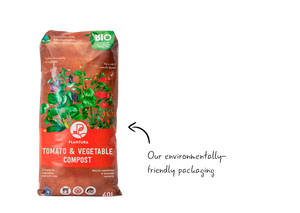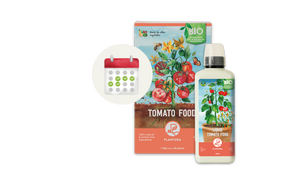Organic Tomato & Vegetable Compost, 40L
- Regular price
- Sale price
- Regular price
- Sale price
- In Set
- Single
Incl. VAT; free shipping on orders over £39
Frequently bought together
-23%
Tomato Food, 1.5kg
Rated 5.0 out of 5 stars
1
- Sale price
- £9.99
- Regular price
Starting at
£12.99
Incl. VAT; free shipping on orders over £39
-18%
Liquid Tomato Food, 800ml
Rated 5.0 out of 5 stars
1
- Sale price
- £8.99
- Regular price
Starting at
£10.99
Incl. VAT; free shipping on orders over £39
Organic Herb & Seedling Compost, 20L
Rated 4.8 out of 5 stars
4
- Regular price
- £12.49
Starting at
Currently unavailable
Incl. VAT; free shipping on orders over £39
-20%
Lawn Feed 10.5kg, 250m2 coverage
Rated 5.0 out of 5 stars
4
- Sale price
- £23.99
- Regular price
Starting at
£29.99
Incl. VAT; free shipping on orders over £39

What makes our tomato compost so special?
Our compost is made of 100% natural raw materials and is entirely peat-free. As a result, it saves up to 60% of CO2 during production compared to conventional vegetable soils. Plantura Organic Tomato & Vegetable Compost contains high-quality green compost, wood fibres, coir pith and expanded clay as well as a dose of animal-free fertiliser. Our potting compost is certified with the ECOCERT label.

What is the packaging made of?
To us at Plantura, plastic is an extremely valuable resource that needs to be recycled properly. For this reason, our compost bags are made from 80% recycled plastic - a sustainable alternative to conventional soil bags that is certified with the Blue Angel (German ecolabel). We are also asking our customers to recycle their empty bags after use.

For an abundant tomato harvest: when should I feed my plants?
Tomatoes are what we call “heavy feeders” and require a lot of nutrients. Because our vegetable compost already contains fertiliser, you do not have to feed your plants for 4 to 6 weeks after planting them in our potting compost. After that, we recommend using our granular Plantura Tomato Food for the vegetables in your veg patch. For your potted plants, our Liquid Tomato Food is the best choice.
Why Plantura
We are a growing company based in Munich committed to bringing you effective and sustainable products. We stand for:













